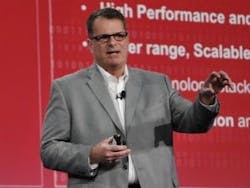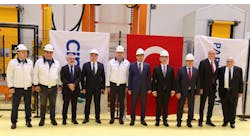"We say PlantPAx is a disruptor in the market, and embodies our philosophy of the modern DCS." Rockwell Automation’s Dave Rapini discussed enhancements to the company’s PlantPAx that further differentiate it from traditional distributed control systems.
Four process experts from Rockwell Automation provided a comprehensive update this week on the company’s multi-year journey into serving users and applications in the process industries.They charted the company's progress in process safety, PlantPAx control system, advanced analytics and global process solutions on the first day of the company’s Process Solutions User Group meeting in the run up to Automation Fair 2018 in Philadelphia.
Leading off with its "safety moment," Steven Del Rio, global business manager, process and machine IA safety, Rockwell Automation, reported that, "Safety used to be a bit of an afterthought, but now it is part of initial system designs, when they're deployed, and in the long term. Now, it's safety first, last, always and everywhere. There's more interest and more safety instrumented systems (SIS) being implemented because users can see the returns they can provide.
"Consequently, users don't just want an SIS for safety,” he said. “They also want an SIS to help them make better decisions, even though there can be some initial conflicts between some SIS’s and their basic process control systems (BPCS) over issues like cybersecurity. As result, we now have security risk assessments to address sources of malware intrusions and continued compliance with the IEC 61511 safety standard."
Recent enhancements to the Rockwell Automation safety system line-up include:
- ControlLogix SIL 2 with 1750 I/O has added Control Flash capability and HART-enabled analog I/O;
- Trusted TMR fault-tolerant control system with improved application execution that's two to three times faster and offers a more robust hardware design, improved packaging for harsh environments, and standard conformal coating;
- AADvance safety system has added CIP produce/consume with status capability, AADvance to Trusted peer-to-peer functions, and Workbench 1.40 and 2.1 software; and,
- OptiSIS pre-engineered SIS that's robust and proven, easy to deploy and use, scalable and flexible with SIL 2 or SIL from 50 to 100 I/O points, and is configured via C&E (cause and effects) software.
PlantPAx progression
Next up was Dave Rapini, business manager, PlantPAx, Rockwell Automation, with an update on the company’s PlantPAx distributed control system, which just saw its Version 4.5 release in August.
"We say that PlantPAx is a disruptor in the market, and embodies our philosophy of the modern DCS compared to traditional/legacy DCSs," said Rapini. "We know we're making progress on this front because we're seeing a lot of the competition trying to match our message and changing their content to try and catch up with us."
Rapini reported that different types of process skids usually have many different control systems that can be hard to integrate into an overall DCS, while the common, modular controls, tools and environment in a modern DCS such as PlantPAx greatly eases integration with the DCS, maintenance, operator training, repair and HMI implementation.
"Many traditional control systems have been running for 20 years without an upgrade or even being touched, so they haven't been able to add any of the technical improvements that have become available during that time,” he said. “And, when they eventually do get a chance to upgrade, they require a wholesale upgrade that requires the entire system to be upgraded.
“However, a modern DCS insulates its components through a set of common services with standardized interfaces, allowing users to upgrade software and hardware components individually as new technologies become available while leaving other components in place."
Rapini added that PlantPAx 4.5 and its roadmap include several improvements and tweaks suggested by customers, including many attending prior PSUG events. Three main areas of enhancement include:
- Smart. For example, it lets users order a common I/O panel with 50-100 points, and coordinate delivery by multiple system integrators and other users worldwide. It also has improved historian capability that can sniff out all the control strategies being used, and determine what tags need to be added to the historian and adds those tags automatically.
- Productive. Because it leverages ISA 101 style displays, navigation and faceplates that improve operator and maintenance teams’ ability to find and correct issues.
- Protected. Because it leverages content from Allen-Bradley Stratix industrial switches and its longtime partnership with Cisco. Now there is area-based security that is more granular and natively available in addition to the role-based security it already possessed.
"Our vision going forward is to invest further in PlantPAx, and continue with our modern DCS message—that's still key," added Rapini. "We're going to focus even more on engineering efficiency, such as going from applications that need several hundred mouse clicks to ones that need an order of magnitude less. We're also going to share data more seamlessly with more clicks built in—so users don't have to make them—which will be especially helpful over the lifecycle of a product.
"We're also going to reduce system complexity with all Rockwell Automation devices talking CIP protocols over standard, unmodified Ethernet, and use report-by-exception functions to push to data servers data values only when the values are relevant. For example, a system with a large I/O count that used to need 10 redundant data server pairs to support its upstream data needs, will likely only need three redundant pair to support the same data requirements."
Advanced analytics
To help users turn advanced analytics into intelligent actions, Michael Tay, project manager, advanced analytics, Rockwell Automation, reported that traditional analytics tools are applying machine learning techniques and tools to diverse data sources to determine what's normal in a given process application, and then use that data to check for anomalies—and do it earlier to enable prescriptive maintenance.
"We're providing the tools to turn users into data scientists, and enable them to secure self-service analytics, but reduce the actions they need to perform to achieve the same results," explained Tay. "We don't just let users know that something is wrong. We tell them why it’s happening."
Chief among these tools is Data Explorer in FactoryTalk Analytics software, which features:
- Model-predictive control to drive coordinated peak performance;
- Energy optimization to reduce spending on power;
- Predictive maintenance to identify equipment issues earlier;
- Anomaly detection for early detection of abnormal operations; and,
- Predictive key performance indicators (KPI) to predict future performance and identify influences.
"Data Explorer does the interactive data preparation to build machine learning strategies in three areas—automate for targeted installations with minimal effort; interact that leverages user knowledge to help plant engineers solve problems; and program that lets data scientists leverage open-source answers to solve problems," added Tay. "Typical outcomes based on MPC, energy optimization and predictive maintenance are available now, and anomaly detection and predictive KPIs are coming soon."
Connecting production
Unifying his colleagues' overall process control roadmap, Allan Rentcome, director, global solutions technology, Rockwell Automation, reported that large oil and gas and other process end users are interested in connecting their production controls to improve predictive analytics, aid data storage, and assist analysis of unstructured data.
"A lot of big data is actually torrential, but it's still in different silos and isn't stored consistently, so it needs a common format," said Rentcome. "If you can't trust your data, nothing else matters."
To provide reliable, secure data with meaning that is timely, available and actionable, Rentcome added that Rockwell Automation is offering its ConnectedProduction solution to connect intelligent assets and share information for operations intelligence. Available on premise or in the cloud, ConnectedProduction is based on intelligent asset management as the foundation of a data-driven operation, but it's also designed to be self-aware, system-aware and self-configuring, as well as possess end-to-end security.
"These tasks usually require all kinds of different skills from users, but ConnectedProduction can do many of them automatically, saves days of time, and reduce errors," added Rentcome. "It's a complete suite of technology, applications and solutions that can support digital transformation in oil and gas and other process applications by putting high-integrity data at users' fingertips. This shortens the path from data to actionable intelligence."
The editors of Control are on-site at Automation Fair 2018 to bring you breaking news, innovations and insights from the event. Once the event is over, they will put together a report featuring the top news. Pre-order your copy today.







